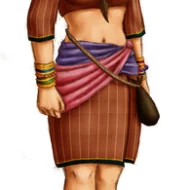Anagolay : Goddess of Lost Things
Listen
Anagolay
Introduction
Anagolay’s tale finds its profound roots in Filipino culture, underscoring the paramount significance of ancestral beliefs in everyday life. This enigmatic deity, often pronounced as “An-ag-o-lay” in the Philippines, holds a unique and mystifying history. Anagolay is venerated as an ancient goddess whose worship traces its origins back to pre-colonial times.
While the precise origins of her name and mythos remain shrouded in obscurity, Anagolay’s enduring presence continues to permeate contemporary Filipino culture. She stands as a potent symbol of the enduring fortitude intrinsic to Filipino beliefs and traditions, resiliently persisting through centuries of external influences. In this light, she stands as a testament to the unwavering tenacity of indigenous spirituality, rendering her a captivating figure within the tapestry of Philippine deities.
Physical Traits
She has long black hair, brown skin, and wears a red dress with gold ornaments. She also holds a golden necklace that represents her power to find lost things.
Family
Anagolay, the sole offspring of Lakapati and Mapulon, possesses a remarkable divine lineage. Lakapati, the revered goddess of fertility, and Mapulon, known as the god of seasons, bestow upon Anagolay a profound connection to the cyclic nature of life and the creative energies that drive it.
Anagolay’s matrimonial bond further solidifies her stature within the pantheon. She is wedded to Dumakulem, a prominent deity in his own right. Their union bore two offspring: Apolaki, the deity associated with the sun, and Dian Masalanta, the goddess who presides over matters of the heart.
Powers and Abilities
Anagolay’s role as the Goddess of Lost Things places her in a distinctive position within Philippine mythology. Her influence reaches beyond mere physical possessions, encompassing abstract notions such as missed opportunities and faded memories. In many ways, she encapsulates the universal human experience of loss and the innate yearning for restoration.
In the era before the arrival of modern religions, the indigenous Filipinos lacked the structured belief systems to address existential queries. Within this backdrop, deities like Anagolay served as a framework for comprehending life’s enigmas. They not only provided interpretations for natural phenomena but also bestowed significance upon the various facets of the human experience.
Modern Day Influence
While Anagolay may not be a household name in modern pop culture, her essence and the universal theme of searching for what’s lost can be found in various contemporary references, often reflecting the intrinsic human desire to recover what has been misplaced, whether it’s physical objects or more abstract aspects of life.
Related Images
Frequently Asked Questions
What is lorem Ipsum?
I am text block. Click edit button to change this text. Lorem ipsum dolor sit amet, consectetur adipiscing elit. Ut elit tellus, luctus nec ullamcorper mattis, pulvinar dapibus leo.
What is lorem Ipsum?
I am text block. Click edit button to change this text. Lorem ipsum dolor sit amet, consectetur adipiscing elit. Ut elit tellus, luctus nec ullamcorper mattis, pulvinar dapibus leo.
What is lorem Ipsum?
I am text block. Click edit button to change this text. Lorem ipsum dolor sit amet, consectetur adipiscing elit. Ut elit tellus, luctus nec ullamcorper mattis, pulvinar dapibus leo.
What is lorem Ipsum?
I am text block. Click edit button to change this text. Lorem ipsum dolor sit amet, consectetur adipiscing elit. Ut elit tellus, luctus nec ullamcorper mattis, pulvinar dapibus leo.
What is lorem Ipsum?
I am text block. Click edit button to change this text. Lorem ipsum dolor sit amet, consectetur adipiscing elit. Ut elit tellus, luctus nec ullamcorper mattis, pulvinar dapibus leo.











